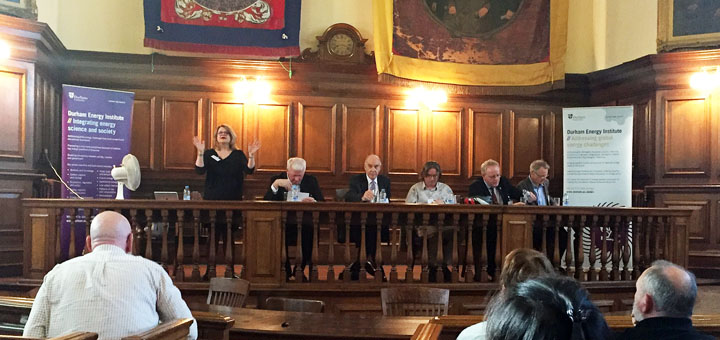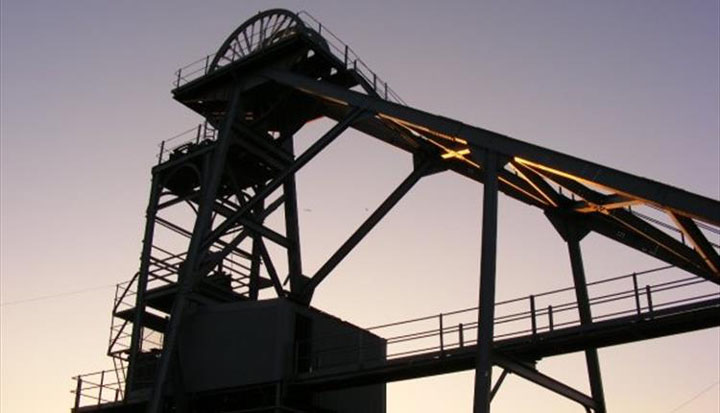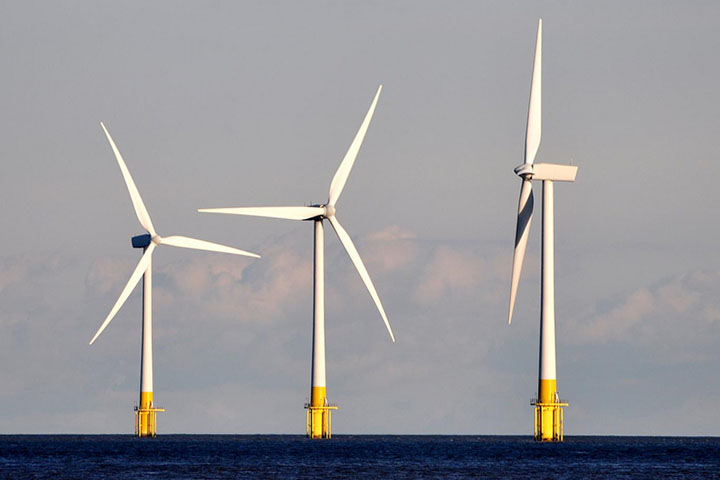Fossil Fuels Future

A public debate about the future of fossil fuels brought together an engaging panel of experts in Durham.
Last Monday evening, the Durham Energy Institute teamed up with the Durham Miners Association to host a public debate about the role of fossil fuels in our future energy. Staged in the century old Miners Hall, the cultural and historical significance of the event wasn’t lost on its audience. At its peak, the coal mining industry employed 170,000 miners in the county, but after a slow decline the last colliery closed in 1994.
The debate was framed within the context of rock-bottom oil prices coupled with the recent Paris agreement on Climate Change. Can fossil fuels help us transition to a low-carbon economy or do they divert attention from the urgency of our zero-carbon goals? The panel, drawn from industry, academia and local politics, represented a broad spectrum of opinion which made for some charged exchanges of views. Despite these, there were some surprising common themes and points of agreement.

A disused colliery
The sovereignty of our energy supply was introduced by Professor Andy Aplin Director at Durham’s CeREES Centre for Geoenergy with an overview of gas sourcing. Providing a third of our total energy needs, the proportion of gas extracted domestically has been dropping for decades and by 2020 we will be importing 80% of it, making the UK vulnerable to energy insecurity. Whilst fracking might provide locally sourced gas for a decade, Aplin advised that the risks of this divisive technology would need to be clearly communicated and tightly regulated.
The development of underground coal gasification in the North East has long been a goal of Tynesider Paul Younger, now Professor of Energy Engineering at Glasgow University. It was with some frustration that he explained how the technology, coupled with Carbon Capture and Storage (CCS) could allow the domestic extraction of fossil fuels without CO2 or methane emissions, if only it was supported properly by government. This could bring jobs back the the region, a sentiment echoed by Alan Cummings, President of the Durham Miners Association. Cummings argued that the UK should be at the forefront of bringing CCS technology to the world, allowing coal reserves to be burned safely, but government support has retreated, leaving one CCS scheme on Teeside to collapse.

Artist’s impression of Carbon Capture and Storage (Alligator film /BUG – Statoil)
Similar challenges are faced by the renewables industry. Alan Lowdon, formerly at NaREC and adviser to the UK and US governments, explained how the wind turbine industry is dominated by the Danes and Germans, despite the UK holding plenty of technical expertise. Onshore wind, now operating on a subsidy-free basis, is being held back by NIMBYism, while offshore wind needs some clear signals of support from government for it to achieve the investment it sorely needs.
“Now is the time to make the change. We must take a step forward not a step backwards.”So should gas or coal with CCS be considered transitional fuels? Paul Younger believes they can provide an energy bridge to a renewable future but stressed that we must be realistic about how quickly we can transform our energy supply and economy. Jonathan Elmer, on the other hand, believes we shouldn’t just fill the energy gap by substituting newer fossil fuels for conventional ones. Elmer, formerly the Sustainable Development Manager at Durhm County Council and now a Green Party activist, made the case for keeping fossil fuels in the ground. “Now is the time to make the change. We must take a step forwards not a step backwards.”

Offshore Wind Turbines (mdpettitt, CC BY 2.0)
It’s true that despite their apparent differences, most of the panel agreed that the transformation to a low-carbon economy must happen as soon as possible. Elmer’s view that this can only been done in tandem with addressing rampant global consumption and population growth was supported by all. “You cannot make a turbine tower out of celery and you cannot make its blades out of wool”There was also agreement that we need to keep our fossil fuels as a resource for industry. “You cannot make a turbine tower out of celery and you cannot make its blades out of wool,” said Younger to make the point that we need coal and gas as feedstocks for industry. However, he went on to agree that we’re mad to ‘burn’ these resources just for their energy, citing a need for a transformation in energy efficiency.
 Perhaps all that separated the speakers was their position on a scale between pragmatism and idealism. The trajectory to a low carbon future is a given, and all agreed that we can’t continue with business as usual. It struck me that the major disagreements were over the details of the technologies at hand, such as energy storage. This underlines the need for debates such as this to help the public understand what’s at stake.
Perhaps all that separated the speakers was their position on a scale between pragmatism and idealism. The trajectory to a low carbon future is a given, and all agreed that we can’t continue with business as usual. It struck me that the major disagreements were over the details of the technologies at hand, such as energy storage. This underlines the need for debates such as this to help the public understand what’s at stake.
There may not have been a consensus on what role fossil fuels should play in our future energy, but the very same evening, Ecotricity reported that for the first time, and for a window of a few hours, no coal had been used to generate UK electricity. A few days later, Renewable UK claimed that for the first time in the UK’s history, the month of April saw wind power outperform coal. Whilst these figures relate only to electricity generation, perhaps the tipping point will come sooner than expected.











